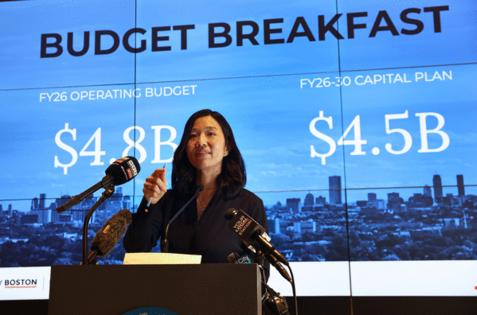Boston Mayor Wu says federal funding 'chaos' could lead to city layoffs, hiring freeze
Published in News & Features
Boston Mayor Michelle Wu said the city may be forced to make layoffs and implement a hiring freeze if anticipated federal funding doesn’t materialize for the $4.8 billion budget she has proposed for next fiscal year.
While blasting the “chaos” from the federal administration that she says is wreaking havoc on the city’s planning for the fiscal year 2026 budget, Wu defended her decision not to cut from the current fiscal year’s budget, which grew by 8% compared to the 4.4% growth she’s proposing for next year’s spending plan.
“Over the last year as we made the case for needed relief for residents when it comes to their tax burden, there were many predictions that if we did not cut the budget last year … then the sky would fall and we would be in the midst of tremendous economic uncertainty,” Wu said. “That has not been the case.”
Wu was referencing the debate around her stalled tax shift plan, which, if approved by state lawmakers, would have allowed the city to increase commercial tax rates to provide property tax relief for homeowners.
The mayor said growth last year was largely due to newly settled union contracts, and that the city made the right decision by resisting calls to cut the budget and pull from its reserve funds, given the uncertainty around federal funding this year.
“We resisted all those, knowing that the most responsible actions were to monitor and make sure that we’d be prepared for true economic uncertainty and potential financial crisis,” Wu said Wednesday at a City Hall budget breakfast. “Unexpectedly, we are in this moment now due to actions from this federal administration.
“But I want to be clear that the budget we’re proposing this year is different than the one that we had proposed last year because the larger macroeconomic situation has shifted.”
While Wu insisted that her administration’s budget planning in past years has been crucial to ensuring the city’s financial health is strong enough to weather the current federal uncertainty, she said the city may still be facing difficult decisions.
The city has never made a midyear budget cut, Wu said, but if some of its $300 million in anticipated federal funding doesn’t materialize, that could change.
“We may well get to the point where we have to be considering layoffs and hiring freezes,” Wu said.
A hiring freeze would be more drastic than the approach the city is currently taking, by not filling positions that have been vacant for more than a year and increasing salary savings “where appropriate,” Wu and her team said.
Such an approach has resulted in a reduced overall headcount in the FY26 budget of nearly 500 positions, the mayor said.
Other cuts include a reduction in discretionary nonpersonnel items like equipment and supplies, Wu said.
“This is a shared sacrifice across all of our departments to ensure that we can keep doing the work that has the most impact for our residents and keep meeting the needs that we know are growing in community,” Wu said.
Still, the mayor said the budget’s proposed 4.4% growth is in line with the rate of inflation and core city departments are growing by 1.7%.
Ashley Groffenberger, the city’s chief financial officer, said Boston hasn’t “experienced any major disruptions this year” in terms of a loss of expected federal funding.
She said, however, that as those funds come in throughout the year, the city will be monitoring the budget, and potentially tweaking it down the line, should there be any fiscal changes after the City Council approves the spending plan in late June.
Wu, who has tangled with the Trump administration over immigration and other policies, told the Herald Monday that the city is already challenging potential federal funding cuts in court. She said there was some unspent COVID emergency relief grant funding for the Boston Public Schools that was canceled, along with a development pipeline grant, although the courts have paused the latter cancellation.
“We, in our city budget, rely every year on $300 million of federal funding that so far has been relatively legally protected, but we know that right now, the law is not seen as a boundary either, and so we need to be prepared for the worst in every case,” Wu said at Wednesday’s budget presentation.
Gregory Maynard, executive director of the Boston Policy Institute, said that the mayor was mistakenly attributing the city’s decision to tighten its budgetary belt this year to the “chaos in Washington, D.C.”
In reality, he said, the lower rate of growth in this year’s spending plan is actually driven by falling office values.
“With Boston’s office vacancies still at historic highs, and more buildings selling for fractions of their pre-COVID value,” Maynard said, “this city’s leaders need to take urgent action or face even more serious fiscal challenges in the years ahead.”
Wu’s mayoral opponent Josh Kraft, son of the billionaire New England Patriots owner Robert Kraft and longtime philanthropist, issued a statement after the event that focused on the city’s $4.5 billion five-year capital plan proposal for FY26-30.
“Budgets are value statements,” Kraft said, “so it is telling that in her capital budget, Mayor Wu has made funding for White Stadium a priority over funding for Madison Park High School and other new school construction.”
_____
©2025 MediaNews Group, Inc. Visit at bostonherald.com. Distributed by Tribune Content Agency, LLC.







Comments